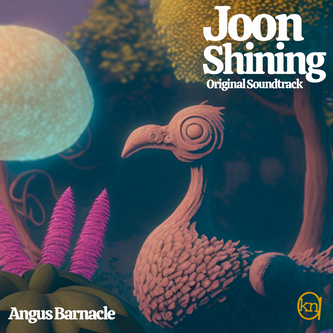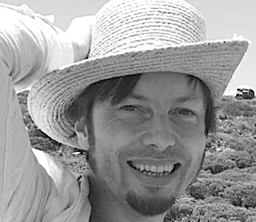Lamplight Forest
Joon Shining's Original Soundtrack by composer
Angus Barnacle is available here on Steam
Angus Barnacle is available here on Steam
How did you get started doing soundtracks for video games?
I had previously written for film, theatre and dance; and I think my general openness to collaboration probably helped to speed things along, but it was really a surprise to find myself composing for games. Al Thumm [Creative Lead of Joon Shining] got in touch one day and said he was familiar with my work from my undergraduate days in Adelaide, and would I be interested in sketching some ideas for an interactive music-puzzle based game "Pallas of Vines". The interactive nature of music-puzzle gaming resonated with me above and beyond what a normal music performance commission would, and I devoted a lot of time to learning about the industry and experimenting with game music as a result. Pallas remains a lovechild work-in-progress, but my appreciation for games as a creative medium grew immensely through the process. It's addictive to be part of an emerging medium that combines sound, story and visual material with interactive elements in such a satisfying way. It's also time consuming, as games are big complex worlds to be created, so it's been challenging to balance composing for live performance alongside game writing and my day job etc, but witnessing the many threads of Joon Shining's creative development synthesise into a playable game has been wonderful, and seeing people enjoy playing it even more-so.
How did you come to work with Orchid of Redemption on Joon Shining?
Al asked me to make some sketches for Pallas of Vines based on my music in other mediums. I learned a lot from Al working on that project and, although that project is too ambitious for us to publish independently, it has been a great success for us in terms of finding a synthesis between music and gameplay. Joon Shining is one of several smaller projects that grew out of Pallas.
What were the key aspects/themes you wanted to focus on for this project?
Joon Shining's streamlined gameplay mechanics and relatively serene pace immediately appealed to me as a vehicle for an immersive aesthetic experience. I think the story adds a lot of dreaminess to that also by tapping into a parallel universe where dodos live again and extinction is ruled by a largely toothless bureaucrat who Joon tries to negotiate with and talks back to. The parallel narratives of Joon's worry about being too clumsy at egg hatching etc as opposed to the dodos' general sense of unconditional contentment also reflect the parallel qualities of daredevil perfectionism and serene timelessness inherent in the gameplay, and I wanted the music to somehow provide space for both parts of that unusual combination. Additionally, I wanted to employ acoustic and even primitive instruments (such as bone clap sticks, rattles, hunting whistles and shell horns) and just intonation to evoke a sense of the pre-colonial world where the dodos flourished.
What are you most proud of with this soundtrack?
Largely inspired by Al's wildly varying environments, a vast array of orchestrations has been used to create the full score for Joon shining, yet I feel it maintains a relatively unified aesthetic. Alongside a twelve note just-tuning system that is consistent throughout the score (allowing for very limited modulation) classic techniques of thematic development have been used to develop variation within a gamut of recognisable traits. For example, the main theme heard in Varidia forms the foundation of most of the other pieces but in inverse, retrograde, transposition and re-harmonised versions. To me, the album takes the listener on a narrative-like journey through wildly varying terrain with an aesthetically palpable connective thread. I think it has an overall sense of bustling and imperfect grandeur thanks to the many large ensembles and orchestral pieces, which were inspired by ancient reports about the dodos being sociable, inquisitive and bold. Mastering the orchestral pieces was fiendishly challenging, and I'm very proud of those results. My favourite track changes with each listen, but recently I felt most engaged hearing the intricately structured but plaintive "Celestial", which provokes my most contemplative listening. It is written for the smallest ensemble of the album (shell horn, dulcitone, shakers and string trio) and, perhaps through its intimacy, I feel the instruments really speak.
More information about Angus can be found at angusbarnacle.com.
© Copyright Lamplight Forest 2025. ALL RIGHTS RESERVED.

